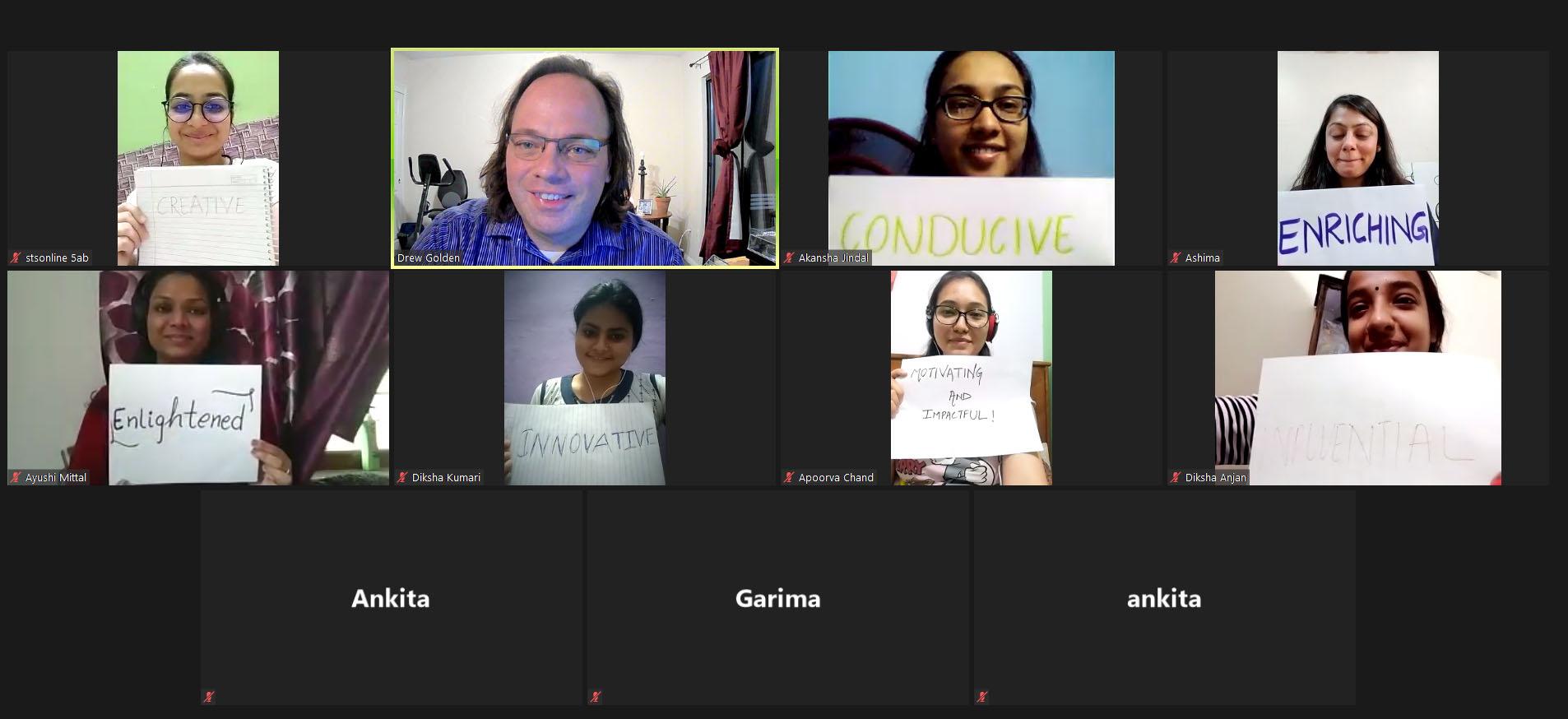
5 minute read
Training Teachers Supporting Students
from July/August 2021
Training Training Teachers, Teachers, Supporting Supporting Students Students
ByMICHAELGALLANT
Thanks to innovative online courses and a
unique international partnership, Indian educators are gaining new tools for teaching English.
When Ayushi Mittal wanted to strengthen her skills teaching English to elementary school students in Delhi, she turned to a groundbreaking new program—and a team of American English Language Fellows located halfway around the world.
Mittal is one of over 650 Indian teachers who participated in two innovative virtual courses sponsored by the U.S. government. U.S. Embassy New Delhi’s Regional English Language Office (RELO) created the courses in partnership with the University of Delhi, in support of India’s National Education Policy (NEP) 2020. The courses incorporated hands-on experience with new classroom technologies, enhancing teachers’abilities to support the development of their students’English language proficiency in all subject areas, as well as critical thinking, creativity, collaboration, digital literacy and other 21st-century skills as directed by the NEP. The teachers will use the skills they learned in the program to benefit tens of thousands of elementary and middle-school students. Nidhi Seth, an assistant professor at the University of Delhi’s Shyama Prasad Mukherji College for Women, played a key role in the development, launch and administration of the courses. The online classes focused on teaching “21st-century skills such as critical thinking and critical literacy,” she says, as well as developing proficiency in fundamental language skills. “The courses are taught by highly qualified and committed English Language Fellows and are free of charge for the students and collaborating institutions. Upon completion of the program, students also receive a certificate from RELO, which serves not only as a reminder of their past achievements, but also an encouragement to remain lifelong learners.”
The program began with a three-week pilot project in September 2020, and quickly attracted interest from hundreds of Indian teachers who were looking both to build their English teaching skills, and to successfully navigate the rocky new terrain of online teaching, during the COVID-19 pandemic. “The three-week pilot project not only focused on principles of language teaching, but also taught the students to create activities for online, offline and blended modes,” says Seth. “They learned to create Google Classrooms and explored different online quiz platforms. Most importantly, they learned how to make online teaching interactive.”
For the main courses, instruction lasted 10 weeks and included lessons and educational content prerecorded by the project’s chief designer, Gina Petrie. Participants also joined live, weekly virtual meetings with one of 19 American English Language Fellows, each specially trained to “clarify our doubts and use activity-based learning strategies to explain topics to us,” describes Mittal.
Texas-based teacher Stacie Davenport was one of the American instructors serving as a fellow for the online courses. Having previously taught English and other subjects in China and Spain, she joined the program after the pandemic thwarted her plans to teach internationally yet again, and describes being excited to serve as “the face, the connection and the personal application our students have throughout the course.”
“As a teacher, it is really important to me that I buy into what I am teaching,” she continues. “It’s hard to motivate your students to learn something


Left: Participants joined live, weekly virtual meetings with one of 19 American English Language Fellows, each specially trained to clarify doubts and use activity-based learning strategies to explain topics.

RELO
facebook.com/ RELOIndiaNewDelhi
you don’t think is truly valuable. In my 11 years of teaching both overseas and in the U.S., I really believe that the things Dr. Petrie covers in these courses are core to good teaching practices in every classroom.”
Seth agrees that Petrie’s work was vital for attracting, engaging and supporting participating students. “Besides the course content, it was her warmth and genuine interest in answering students’queries that kept the students engaged,” she says.
For Mittal, the experience was highly positive. “I was able to learn new strategies and techniques of teaching the English language to elementary grades using various resources,” she says. “Also, I learned about higher-order skills which are important, and need to be addressed in higher grades. Since the course was activity-based, it helped me connect better to the resources and study material provided.”
Students and organizers alike see great potential for the courses to continue and broaden. “My hope for these courses is that they will be used in every teaching university in India and continue to expand to other countries for teachers all over the world,” Davenport says, “even in the U.S.—and not just for students learning to be teachers, but also offered as training for current teachers in our classrooms.”
If you’re a teacher in India and are interested in joining future courses, Mittal advises that self-motivation is key for success. “The resource persons are facilitators who give direction to our thought process,” she says. “The individual needs to involve herself thoroughly in the learning process and participate in the discussions.”
Davenport also encourages students to be diligent and commit to the learning process presented by the courses. “Each class builds on the next,” she says, “and if you’re just looking for another certification to add to your résumé, there are probably easier options. However, if your desire is to really make a difference as a teacher, if you long for your students to make meaningful connections to what they are learning and if you’re up for the challenge of taking your instruction a step deeper than has usually been done, then this is the course for you.”
Michael Gallant is the founder and chief executive officer of Gallant Music. He lives in New York City.










